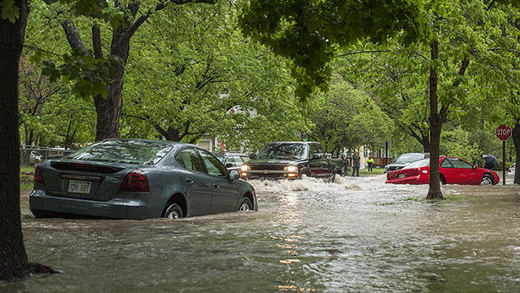
K-State Research and Extension offers emergency preparedness educational resources for individuals, families and communities. | Download this photo.
Think fast, but plan ahead: Emergency preparedness resources are available
K-State’s Prepare Kansas and other resources can aid recovery from disasters
March 27, 2019
MANHATTAN, Kan. – We have how much time to get out? No one wants to think about it, but spring flooding in the heartland and the prospect of summer storms remind us of the harsh toll that disasters can take.
Nebraska sustained more than $1 billion in estimated property, crop and livestock losses from flooding early this year. Other states also suffered significant losses. And that doesn’t count the emotional and physical toll.
We can’t control the weather affecting our homes, businesses and communities, but we can prepare ahead, which can make recovery after a catastrophe easier.
Kansas State University serves as a source for emergency preparedness education and disaster recovery resources through several K-State Research and Extension initiatives, including the Prepare Kansas blog, the annual Prepare Kansas online challenge in September and through its affiliation with the national Extension Disaster Education Network, or EDEN.
When disaster preparedness comes to mind, many of us think about having a grab-and-go kit at the ready, but thinking about financial readiness is also important.
“We will all likely experience a weather disaster or other emergency at some point,” said Elizabeth Kiss, extension financial management specialist and author of the Prepare Kansas blog, adding that your ability to respond and recover can go more smoothly if you:
- Prepare for a disaster or other emergency by accumulating emergency savings. Small amounts add up over time and can make a big difference.
- Understand and regularly review your insurance coverage. For example, flood damage is typically not covered by homeowner's and renter's policies yet only one inch of water can cause thousands of dollars of damage.
- Collect and secure important documents. Start or update a household inventory.
Kiss and a team of extension colleagues created a factsheet: Get Financially Prepared: Take Steps Ahead of Disaster and noted that the Federal Emergency Management Agency has good information on its Financial Preparedness page.
In support of their communities, many agents in county and district K-State Research and Extension offices across the state provide programs on emergency preparedness for individuals and families, plus farmers and ranchers. Some serve on their county’s emergency planning committees or in similar roles.
Andrea Burns, a K-State Research and Extension agriculture and natural resources agent in Ford County, said she believes it’s a natural fit for her to work with others locally to help keep the community as prepared for disasters as possible.
Burns serves on the Ford County Local Emergency Planning Committee, attends emergency-preparedness training and participated in a recent statewide exercise conducted by the Kansas Department of Agriculture. She is working with the LEPC staff and Ford County Fair Association to write an emergency plan for the Ford County Fair and to organize a “Hometown Heroes” event at the 2019 fair.
K-State’s affiliation with EDEN links it to a network of universities across the country that works to reduce the impact of disasters through research-based information. Made up of specialists in disciplines such as community development, food safety, financial management, youth development, engineering, crops, livestock and more, EDEN offers preparedness courses for extension educators and the public such as Ready Business, Family Preparedness and others. The network is a resource for extension educators across Kansas and the country.
Service climatologist and Kansas Weather Data Library manager Mary Knapp provides weekly Weather Wonders, which are short audio messages about weather and sometimes emergency preparedness, available online through the K-State Radio Network.
“At this time of the year, remember to review your emergency plans, including your emergency kit,” Knapp said. “Check that everyone in your household is familiar with the plan and prepared to take action if needed. Test your methods of receiving alerts – whether from your phone, a weather radio, or email – to make certain that everything is still working properly. A few minutes invested in preparations now can go a long way in the case of an emergency.”
The Kansas Weather Data Library on K-State’s Manhattan campus is a repository for Kansas weather and climate information and is home to Kansas Mesonet.

